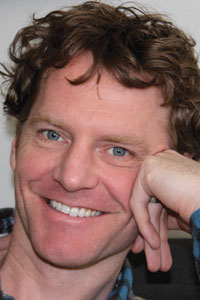Joe Magee
 New York University Wagner Graduate School of Public Service & Stern School of Business, USA
New York University Wagner Graduate School of Public Service & Stern School of Business, USA
What does your research focus on?
I study the influence of social hierarchy on thought and behavior, and how people construe and communicate about their social worlds. The theme that ties these areas of research together for me is social power, defined by the dynamics of dependence and control in interpersonal relationships. In particular, I am interested in how the existence of power in social relationships and organizations plays an important role in construal and behavior.
What drew you to this line of research? Why is it exciting to you?
Social inequality and injustice are pervasive phenomena that have always bothered me. Trying to understand the different psychological worlds that people inhabit based on the social structures in which they reside seems like a basic, useful step in addressing these social problems.
Who were/are your mentors or psychological influences?
As an undergraduate at the University of Michigan, I was lucky to have two thoughtful mentors, Frank Yates and Tom Finholt. Deb Gruenfeld, my doctoral advisor at Stanford University, was an excellent mentor for how to think creatively and write with imagination. Lara Tiedens sharpened my thinking substantially. All of my collaborators, particularly Adam Galinsky of the Kellogg School of Management, have been generous with their time and ideas, exerting immeasurable influence on my research.
To what do you attribute your success in the science?
I attribute any success I have had to a sizeable network of smart and generous people and my own consumption of multidisciplinary social science research.
What’s your future research agenda?
I am trying to consolidate what my co-authors and I have learned about social hierarchy and power with a couple of review articles (with Adam Galinsky and Pam Smith), and I am expanding the methods that I use and topics that I study by collaborating with colleagues on new projects in social neuroscience (with Malia Mason and Susan Fiske) and interracial interactions (with Tessa West).
Any advice for even younger psychological scientists? What would you tell someone just now entering graduate school or getting their PhD?
I would advise budding social psychologists to look for interesting problems to which people have not applied adequate social psychological theory. Read outside of social psychology in the neighboring fields of economics, sociology, political science, and organizational behavior, and spend more time reading work published before 1980 than after.
What publication are you most proud of or feel has been most important to your career?
Magee, J. C., Milliken, F. J., & Lurie, A. R. (2010). Power and the construal of a crisis: The immediate aftermath of September 11, 2001. Personality and Social Psychology Bulletin, 36, 354-370.
I am most proud of this publication because my co-authors and I were able to bring intellectual creativity and analytical precision to bear on basic psychological processes related to an important social event.





APS regularly opens certain online articles for discussion on our website. Effective February 2021, you must be a logged-in APS member to post comments. By posting a comment, you agree to our Community Guidelines and the display of your profile information, including your name and affiliation. Any opinions, findings, conclusions, or recommendations present in article comments are those of the writers and do not necessarily reflect the views of APS or the article’s author. For more information, please see our Community Guidelines.
Please login with your APS account to comment.